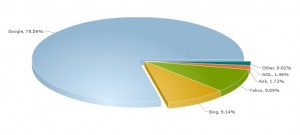Bing vs. Google
http://www.alexa.com/topsites/countries/US
http://www.bing.com/community/site_blogs/b/search/archive/2011/05/16/news-announcement-may-17.aspx
http://www.entrepreneur.com/article/205842
A previous blog post on this site entitled “You are the company you keep” explores the structural balance between the social networks that individuals are a part of and the decisions that individuals make. The conclusion that the post eventually comes to is that structure balance is maintained only when an individual belonging to a certain network adopts the same behaviors and opinions of the reigning fraction of the network. Basically, as the name of the post implies, your “success” depends heavily on the company that you decide to keep.
Though this idea stems from relationships and interactions in the real world, it can be applied to those in the virtual world, as well. Let us look at the world of online search engines. Most of the world’s known search engines generate revenue via paid advertisements. The idea is simple, but effective – have advertisers display their advertisements on your search engine and pay every time a user clicks on their advertisement. The optimization on the idea is simple too – use the keywords entered in the search engine to filter which ads to display. The better suited ads are to users on the search engine, the more ad clicking will take place, thus the more revenue the search engine generates.
Now let’s bring in a real example. Enter Bing, a relatively popular search engine. Though the giant blue chunk of Google seems to dwarf Bing’s yellow slice in the pie chart below, do not be fooled, Bing is not doing too shabbily. According to Alexa, a web information company, Bing ranks in as the fifteenth most visited website in the United States and is in control of roughly 9% of the search engine market.
Figure 1: Taken from Statowl Statistics
One may see this and say, okay great, but what does that mean next to 79% possession of the search engine market and its spot at number one in the list of most visited websites? Bing can’t seriously give Google a run for its money (in the most literal sense), can it?
Judging from the numbers on Alexa and the pie chart, no, but fortunately for Bing, these numbers do not tell the whole story. Bing has recently been declared the primary search engine of Facebook, the social networking site boasting over 800 million active users as of this past summer and holding the spot of second most visited website on Alexa. This means many good things for Bing. As the largest social networking website in the world, Facebook can (and does) provide Bing with user information that can optimize the already effective targeted advertising approach. Thanks to Facebook, Bing has the information to filter advertisements not only by entered keywords, but by location, interests, age, and group involvement of users, too. Taking it a step further, since Facebook links individuals to one another via the “friend” feature, Bing can also filter advertisements using the actions and preferences of the friends of an individual user, thus can take full advantage of the first concept introduced in this post, the structural balance between individuals and the behaviors of their friends.
But the question still remains: can Bing give Google a run for its money?
With this partnership with Facebook, Bing definitely has the potential to become more than a 9% shareholder of the search engine market. I know that for me, its new targeted advertising approach is working. Facebook-Bing knows my major, school, interests, and social organizations and the ads they’ve been displaying on my profile are very specialized and very appealing. Honestly, I’ve clicked on ads on Facebook many more times than I’ve ever clicked on Google. Facebook-Bing has a ways to go before upsetting Google’s 79% share, but it’d definitely be in Google’s interest to watch out!

